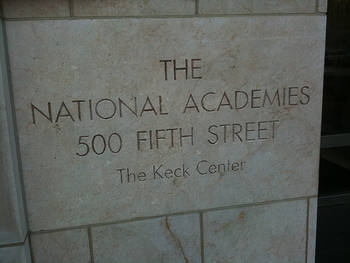Future Now
The IFTF Blog
Geoengineering at the National Academy of Sciences
It's amazing what can happen in five years.
On October 13 2010, I delivered a talk on the political and ethical dilemmas surrounding geoengineering at the National Academy of Sciences. I spoke at a meeting organized by the Government-University-Industry Research Roundtable (GUIRR), a group within the Academies that identifies issues needing more attention. With representatives from major research universities, big technology companies, and multiple government agencies in the audience, the meeting made it very clear to me that not only has the idea of geoengineering (or "climate engineering," in the current language) become a mainstream topic, it's being taken as a deadly serious possibility.
That was definitely not the case not too long ago. In July of 2005, when I first wrote about geoengineering (referring to it, as in the title of this piece, as "terraforming the Earth"), it was not a mainstream topic, to say the least. If anyone outside of a small band of scientists and engineers gave a moment's thought to the idea of large-scale modifications of the climate, it was to laugh at it -- particularly the notion of putting mirrors into orbit (parodied beautifully in Futurama's "Crimes of the Hot" episode). Still, there was something about the concept that seemed to me to be worth watching.
In 2005, I observed that many of the supporters of geoengineering saw it as a way to avoid having to change our technological, economic, and social systems in ways that would reduce (and eventually eliminate) anthropogenic carbon emissions. The actual climate scientists talking about the idea, though, saw it very differently: given the speed with which climate change was happening, the planet might hit a global crisis point before it was able to reorganize itself to move to a zero-carbon economy; in their view, geoengineering might allow us to forestall disaster long enough to deal with carbon. Geoengineering would enable carbon emissions reduction, rather than make it unnecessary.
Today, while some supporters of geoengineering remain stuck in the "get out of carbon reductions free" mindset, the clear majority of people involved in the debates around climate engineering recognize that it's not a solution in and of itself. Moreover, although one of the fears about geoengineering has been that it might make people less likely to support carbon reductions -- the so-called "moral hazard" problem -- a couple of the speakers at the meeting referred to a recent Royal Society-sponsored survey with surprising results: discussions of geoengineering actually make people, particularly climate skeptics, more likely to support carbon reductions, simply because geoengineering is seen as so extreme. A substantial "public dialogue" process (PDF), organized by the UK's Natural Environment Research Council (NERC), made it very clear that when people learn more about geoengineering, they in turn demand greater effort at carbon mitigation. While this public dialogue solely involved UK citizens, it's certainly suggestive of how other communities might respond.
The rules of the National Academies meeting were such that while I'm free to talk about the various presentations and discussions, I'm not supposed to identify who said what. What I can say is that there's still quite a bit of debate about the efficacy and possible side-effects of various climate engineering projects -- yet even the ostensible proponents were quick to point out the likely drawbacks, and the self-identified opponents wouldn't rule out the possible need.
Speakers wove together climate science, political concerns (from multiple partisan perspectives), ethics, and methods for wrestling with uncertainty. We had presentations from folks of the caliber of Ken Caldiera, Alan Robock, and Denise Caruso. And while there was plenty of debate, everyone in the room agreed on three big ideas:
- Climate disruption is happening fast, and we are rapidly losing any chance we might have to avert its worst effects through carbon reductions alone;
- Climate engineering needs a great deal more research (even making geoengineering research 1% of overall climate change research would be a vast increase), to identify both best options and techniques to avoid;
- Because "desperate people do desperate things" (a line from my talk), there's a very real chance that someone will attempt to use climate engineering.
(I added the "desperate people" line to my talk because, as much as we are all concerned about the ecological side-effects and global political repercussions of climate engineering, this is ultimately about people trying to save themselves from disaster; we can't forget that human lives are at stake. The line seemed to strike a nerve, and several of the subsequent presenters repeated it. One told me that it crystallized a core issue about geoengineering.)
Beyond the three consensus points, most people in the room (although I wouldn't necessarily say everyone) agreed that geoengineering research and policy deliberations must be as transparent and open as possible. It would be very easy to interpret even the most altruistic climate engineering efforts as conspiratorial and anti-democratic, because of the sheer scale and global impact of the projects. Moreover, since ultimately we are all interested in the planet's health, voices beyond just a narrow set of scientists need to be heard. It would be easy to get this wrong, with disastrous results.
This is the right time to address this issue. It does not yet appear that anyone has started to develop actual geoengineering tools, but the pathway to doing so is short. The moment we have a trigger event -- a series of repeated drought years, perhaps, or unprecedented set of storms -- there will be calls to do something, anything, to avoid catastrophe. For desperate people, willing to do desperate things, geoengineering will look like a very attractive option.
The problem isn't that we don't yet know enough to be able to say "yes" to geoengineering with any certainty; the problem is that we don't yet know enough to be able to say "no," and mean it.




